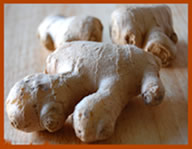 For many yogis, ginger is a commonly used spice. Combined with cardamom, cinnamon, cloves and peppercorns, it is often used to make Yogi Tea. When used in Yogi Tea or on its own, ginger can benefit your yoga practice.
For many yogis, ginger is a commonly used spice. Combined with cardamom, cinnamon, cloves and peppercorns, it is often used to make Yogi Tea. When used in Yogi Tea or on its own, ginger can benefit your yoga practice.
Ginger has long been recognized around the world, particularly in China and India, as an effective herb for enhancing health. It is particularly beneficial for the circulatory, digestive and respiratory systems.
Your respiratory system often has to work harder in cold weather when practicing yoga and breathing techniques. You may find during this time that you’re having trouble getting a full breath. Ginger can help to warm the upper respiratory tract and improve breathing. It’s also commonly used for treating the flu and colds. For soreness associated with your yoga practice, ginger acts as an excellent anti-inflammatory. Furthermore, it aids in circulation which can help to heal sprains and strains and ease arthritis. Yogi Bhajan commonly recommended ginger, particularly for lower back problems.
While it’s best to practice yoga on an empty stomach, your schedule may not always cooperate. If you’re feeling a little full, ginger can help to stimulate digestion. This spice is also great for relieving cramps and bloating. Other ailments that might inhibit your yoga practice, including exhaustion, migraines, menstrual cramps, morning sickness and nausea, can also be relieved with ginger. Even stress can be alleviated by ginger due to its mood elevating properties.
Ginger can be taken in a variety of ways. It’s an excellent spice for cooking and can be used either fresh or dried. Dried ginger is often stronger than fresh, making it ideal for use with beans, lentils and other hard to digest foods. Fresh ginger, on the other hand, is packed with beneficial natural oils. Fresh ginger can be added to smoothies, put through the juicer for ginger juice, or steeped for several minutes in hot water for ginger tea. And, of course, ginger and other spices can be combined to make Yogi Tea.
Ginger can also be inhaled, which can prove particularly beneficial for sinus problems, colds, allergies and even exhaustion. Simply heat a pot of ginger and water, turn off the burner, place your face over the steam, cover your head with a towel, and inhale the powerful scent of ginger through your nose for several minutes. The boiled ginger water can also be used to make a hot compress for easing sprains, swelling and pain.
